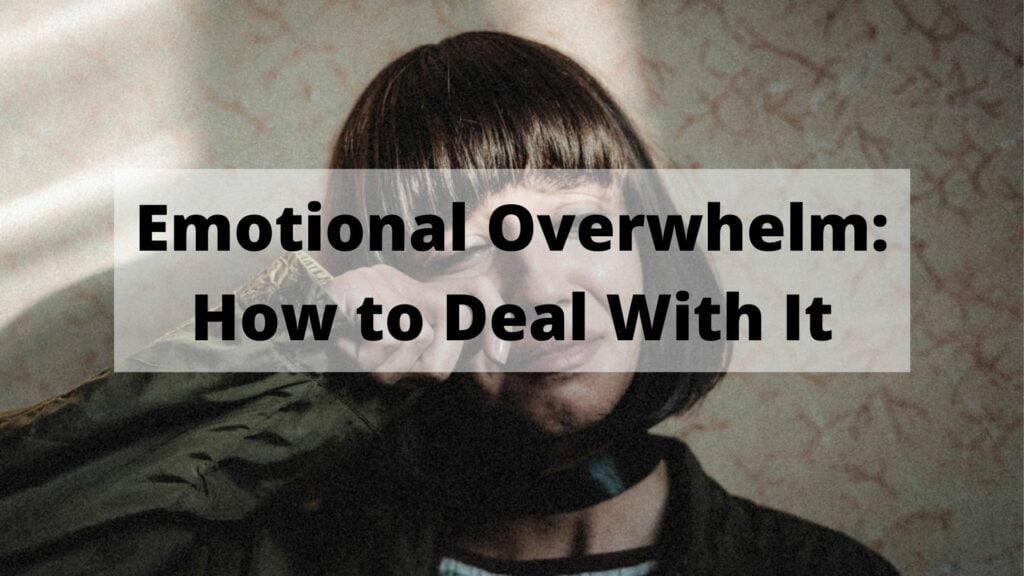Emotional overwhelm is an emotional state that can affect anyone. It’s a feeling of overwhelm by emotional demands. Often to the point of not knowing how to cope or even what emotional needs are being met. Emotional overwhelm usually results from a variety of conditions including stress, anxiety, and depression.
This article has covered every aspect of emotional overwhelm. If you or someone you know is suffering from emotional overwhelm, Then this article might help you out.
Contents
What Is Emotional Overwhelm
Emotional overwhelm is a condition in which you are being bombarded by powerful emotions that are hard to handle. It might affect your capacity to reason and act logically. It could also prevent you from completing essential chores.
Emotional overloading may impact your personal or professional life, and you may be unable to think or act rationally or effectively. Emotional overload can occur for a short period or over a longer time as a result of an exceptionally stressful time at work, a distressing personal experience such as losing a loved one, or another triggering cause.
This overwhelm can occur when a person has several problems and difficulties in quick succession. This may trigger him or her to overwhelm by uncontrollable feelings. The following are examples of typical events that might induce emotional overloading:
- Relationship issues
- Physical or mental health illness
- A demanding job
- Lack of nutrition
- Financial distress and insecurity
- Significant life changes
- Time constraints
- Death of a loved one
- Personal traumas such as abuse
- Habitual lack of sleep
Emotional overwhelm might be the result of stress, traumatic experiences in one’s life, relationship difficulties, and a variety of other factors. If you’ve been feeling emotionally overwhelmed for an extended period. You may want to see a mental health professional.
Symptoms of Overwhelm
When a person is feeling overwhelmed, it may manifest in a variety of forms.
Anxiety, anger, or significant irritation and worry are symptoms of this condition. Doubt and helplessness may be felt throughout the day. When a person becomes angry or emotional. These symptoms can show up: panting, sweating, shortness of breath, or chest pain.
Often, as unpleasant as it is uncontrollable, overwhelm is also unavoidable.
Emotional overwhelm might make it hard to look after yourself. You may forget to eat meals, skip rest periods, or have trouble falling asleep. These actions can lower your ability to think logically, making it all the more difficult to deal with stress.
This cycle can lead to physical issues if left unchecked. You could experience unexplained pain or persistent tiredness. Your body’s resistance to infection may deteriorate as your negative emotions arise.
Emotional overload may have a detrimental impact on your social life. You might become irritable or avoid interacting with others. These actions might damage your relationships with family and work colleagues.
Why Do I Cry So Much

When confronted with a lot of information, some individuals have been known to cry. It’s perfectly normal to shed tears! Everyone does it, but not all people do so as frequently as others. According to research, women cry 30-64 times per year, whereas males cry 5-17 times each year. This gender difference emphasizes how men’s crying has been unfairly stigmatized as a sign of weakness.
As a result, these findings are very likely incorrect. Crying is not only natural but also good for us since it helps us to better comprehend ourselves. It has several beneficial impacts and can help reduce stress, which often results in a therapeutic sensation.
If you believe that you cry excessively, are inconsolable, or that crying hampers your daily activities, you should talk to your doctor. Crying may be an indication of an underlying mood problem such as sadness or another mental health condition like anxiety if this is the case.
Causes of Emotional Overwhelm
At some point, you will undoubtedly feel a sense of emotional overload. This might be caused by a single major stressor at other times. After surviving a traumatic accident or losing a loved one, it is typical to be overwhelmed.
Overload can also be caused by a variety of lesser stressors. Missing your bus, for example, may not appear to be too significant on its own. However, if you’ve been fighting with your family, haven’t slept well, and are hungry because you skipped breakfast, a missed bus might be the “last straw” of the day.
A person is generally more prone to be overwhelmed by a lot of negative emotions — anger, fear, anxiety, or guilt. It’s often difficult to pinpoint the source of the stress. The reason a person’s body responds so violently to this unpleasant emotion is due to cortisol production, known as the “stress hormone.”
Emotional overwhelm may be more difficult to deal with for some people than for others. It’s easier for you to control your anger than it is to bear intense terror or sorrow. If you’re experiencing a lot of conflicting emotions at once, emotional overload is certainly a possibility.
When you’re feeling overwhelmed, your body releases cortisol. This causes you to be overly anxious. At the same time, our serotonin reserves, the chemical that helps our bodies fight depression and anxiety, begin to run low. This synergy leads to a strong sense of total despair when overwhelmed.
Signs You May Have Emotional Overwhelm

What signals do you give that you are emotionally exhausted? You may determine that you’re emotionally overwhelmed if you have a variety of factors.
These include the following:
- You overreact to insignificant things, e.g. not finding a pen.
- Are tired or physically unwell without a valid reason.
- It’s challenging for you to focus on simple things/everyday activities.
- Withdrawing from family and friends.
- You have a sad cloud around you, even during happy times.
- Are battling despair and feeling powerless.
Preventing Emotional Overwhelm
Even if you’re not sure why, if you sense overwhelm approaching. There are a few things you may do to manage your emotions both on your own and by enlisting outside assistance.
1. Accept the Anxious Feelings
All-consuming emotions are likely to lessen little by fighting them off in a tense situation. Try to keep in mind that anxiety, to some extent, is natural and accept it as a tool for coping with those terrible feelings (when feasible).
2. Reverse Your Thought Processes
Overload occurs when you’re experiencing feelings of unpredictability and despair. Anxiety can result from excessive thinking, which may lead to significant suffering. Stop those harmful thoughts before they become habit-forming ruminations by asking yourself if they are reasonable or beneficial. Try to think of more optimistic ways at the same time.
3. Take Some Deep Breaths

When you purposefully breathe in deeply, your body’s relaxation response is active. It can also be useful during especially trying times. Furthermore, practicing yoga, meditation, and progressive muscular relaxation can aid in the reduction of anxiety by helping you to focus your breath.
4. Be In The Moment
If your thoughts revolve around what the future has in store — whether it’s a few minutes or many years into the future — you may be more prone to emotional overwhelm. Consider one interval, activity, and experience at a time, right now, to avoid uncontrollable thoughts from occurring.
5. Know Your Resources
There is a wealth of scientific research on how stress and anxiety impact our cognitive capabilities, so learn about them by using internet search tools to discover what studies and recommendations resonate with you. To improve your capacity to handle those emotions, look for what research and suggestions match your beliefs using online search engines.
Therapy And Emotional Overwhelm

When you’re not able to stop persistent thoughts or feelings, therapy can be a useful tool in coping with them. A qualified expert can help you sort through the issues that cause your stress and anxiety and better comprehend its underlying causes in therapy.
When you know what stressors and circumstances set off this unpleasant mental condition, it aids to develop a more peaceful state of mind in the future. When looking for the best treatment to address overwhelming feelings, there are many different types of therapies to explore.
Meditation, hypnosis, and centering approaches are in use in various types of therapy to assist trainees to relax during times of stress. A therapist may also suggest journaling or physical activity, both of which have provided aid in the prevention of emotional overload.
Conclusion
If you are feeling overwhelmed. It is important to take care of your physical and mental health to prepare for the challenges ahead. We all experience times where we feel like life may not make sense or that there’s too much going on around us. The best way to deal with these feelings is by taking time for yourself, making sure you eat well and exercise regularly, getting enough sleep each night, practicing mindfulness techniques when possible (and attending therapy if necessary). Remembering what makes you happy will help build resilience so that even during difficult periods in life you can better cope with stressors.
If you are looking for affordable Online Counseling MantraCare can help: Book a trial therapy session


